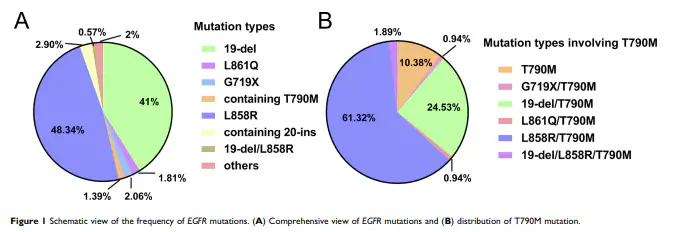Poor Prognosis With Coexistence Of EGFR T790M Mutation And Common EGFR-Activating Mutation In Non- Small Cell Lung Cancer

Abstract
Purpose Previous studies have shown that the presence of EGFR T790M mutation may reduce the treatment efficacy of tyrosine kinase inhibitors (TKIs) in EGFR-mutant lung cancer. However, little is known about the clinical features and outcomes of EGFR T790M mutation in pretreated patients with NSCLC.Patients and methods: The clinical features of EGFR-activating and T790M mutations were assessed in a large cohort of patients with EGFR-TKI-naïve NSCLC (all/EGFR mutations, n=16,347/7,687). The correlation between the pretreatment T790M mutation status and clinical outcomes was evaluated using univariate and multivariate analyses.Results: Pretreatment T790M mutation was reported in 1.39% of the patients and coexisted with an EGFR-activating or uncommon mutation. The dual EGFR T790M and common EGFR-activating mutations were more likely to be detected in lung adenocarcinoma,whereas single T790M mutation was more prevalent in non-adenocarcinomas. The presence of de novo T790M mutation correlated with reduced recurrence-free survival (RFS) in patients with NSCLC (odds ratio [OR] 3.37, 95% confidence interval [CI] 1.67–6.79, P =0.001). After molecular stratification, T790M mutation was shown to exert adverse effects on the RFS of EGFR 19-del group (OR 2.89, 95% CI 1.10–7.91, P = 0.028) and EGFR L858R group (OR 3.43, 95% CI 1.33–8.88, P = 0.013)Further,morepretreatment T790M mutation promoted tumor metastasis to different sites.Conclusion: T790M-positive tumors presented special clinical features, and the coexistence of T790M and common EGFR-activating mutations was associated with poor prognosis in patients with NSCLC.